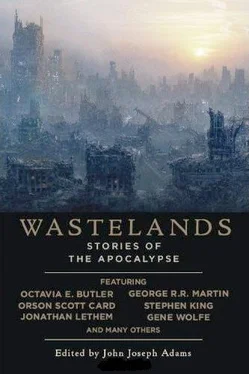The story goes that we got him to a hospital, and the doctors were able to stabilize him enough to put him in a cryogenic chamber. That chamber went on the next transport ship to a distant world where Saronda was waiting, and where they have the medical science to heal him. Someday, when he’s recovered, he’ll come back to Earth again, to KanHab. In the meantime, Artie’s Angels are still here, seeing that what he started doesn’t die.
That’s the story. But Artie died in my arms that night, and no med-evac bothered to come. Not to B9. Louis and I took him underground, to a place where a collapsed tunnel had left only a crawl space. We laid him in there and sealed it up, and we didn’t tell anyone else. Then I concocted that story about the cryogenic chamber. Ha. As if KanHab had any such thing.
So that is the truth of what happened to Artie D’Angelo, but don’t try to tell that to anyone in KanHab. He has become larger in death than he ever was in life-I have seen to that. A brutal act of nihilism deprived me of my friend, my pack leader, my guiding light, but I will not let it deprive KanHab of hope. The stories of Artie’s exploits grow richer with each telling; and in them he succeeds, in ways he could only dream of, in protecting the helpless and improving the lives of those he left behind.
For us, he turned down a chance to live hundreds of years in comfort and peace with his beloved. I will give him, in its place, immortality.
Sleep well in Avalon, my Arthur. KanHab will not forget.
Judgment Passed
by Jerry Oltion
Jerry Oltion is the author the novels Paradise Passed, The Getaway Special, Anywhere But Here , and several others. In 1998, he won the Nebula Award for his novella “Abandon in Place,” which he later expanded into a novel. He is also the author of more than 100 short stories, most of which have appeared in the pages of F&SF and Analog .
“Judgment Passed,” which is original to this volume, tells of the Biblical day of judgment from a rationalist viewpoint; a starship crew returns to Earth to find that the rapture has occurred without them. Oltion has strong views on religion—namely that it’s a scourge on humanity—that led him to write this story, which speculates on whether or not being “left behind” would be such a bad thing.
It was cold that morning, and the snow squeaked beneath my boots as I walked up the lane in search of Jody. Last night’s storm had left an ankle deep layer of fresh powder over the week-old crust, and her tracks stood out sharp and clear as they led away through the bare skeletons of aspen trees and out of sight around the bend. She had gone toward the mountains. I didn’t need to see her tracks to know that she had gone alone.
Except for Jody’s footprints there was no sign of humanity anywhere. My boots on the snow made the only sound in the forest, and the only motion other than my own was in the clouds that puffed away behind me with every breath. Insulated as I was inside my down-filled coat, I felt an overwhelming sense of solitude. I knew why Jody had come this way. In a place that was supposed to be empty, she wouldn’t find herself looking for people who weren’t there.
I found her sitting on a rail fence, staring out across a snow-covered field at the mountains. She sat on the bottom rail with her chin resting on her mittened hands on the top rail. Her shoulder-length brown hair stuck out below a green stocking cap. There were trenches dug in the snow where she had been swinging her feet. She turned her head as I squeaked up behind her, said, “Hi, Gregor,” then turned back to the mountains. I sat down beside her, propping my chin on my hands like she had, and looked up at them myself.
Sunlight was shining full on the peaks, making the snowfields glow brilliant white and giving the rocks a color of false warmth. No trees grew on their jagged flanks. They were nothing but rock and ice.
The Tetons, I thought. God’s country. How true that had proved to be.
“I’d forgotten how impressive mountains could be,” I said, my breath frosting the edges of my gloves.
“So had I,” she said. “It’s been a long time.”
Twelve years. Five years going, five years coming, and two years spent there, on a dusty planet around a foreign star.
She said, “There was nothing like this on Dessica.”
“No glaciers. It takes glaciers to carve up a mountain like that.”
“Hmm.”
We stared up at the sunlit peaks, each thinking our own thoughts. I thought about Dessica. We’d waited two months after landing to name it, but the decision was unanimous. Hot, dry, with dust storms that could blow for weeks at a time—if ever there was a Hell, that place had to be it. But eight of us had stayed there for two years, exploring and collecting data; the first interstellar expedition at work. And then we had packed up and come back—to an empty Earth. Not a soul left anywhere. Nothing to greet us but wild animals and abandoned cities full of yellowed newspapers, four years old.
According to those papers, this was where Jesus had first appeared. Not in Jerusalem, nor at the Vatican, nor even Salt Lake City. The Grand Teton. Tallest of the range, ruggedly beautiful, a fitting monument to the son of God. I could almost see Him myself, floating down from the peak and alighting next to the Chapel of the Transfiguration back by the lodge where we’d spent the night. Hard as it was to believe, it was easy to imagine.
What came next was the hard part. He’d apparently given people six days to prepare themselves, then on the seventh He had called them all to judgment. No special call for the faithful, no time of tribulation for the unbelievers; He’d hauled everyone off at once, presumably to sort them out later. The newspapers were silent on the method He’d used, all the reporters and editors and press operators apparently caught up in the moment along with everyone else, but I couldn’t imagine how it had worked. Most people had expected to rise into the sky; but above 15,000 feet they would start to asphyxiate and above 40,000 or so their blood would boil. Not quite the sort of thing I imagined even the Old Testament God would want His faithful to endure. Slipping into an alternate dimension seemed more likely, but I couldn’t imagine what that would be like, either.
Trying to visualize the unimaginable reminded me why I’d come looking for Judy. “The captain’s going to be holding services in a little while. She thought maybe you’d like to be there.”
Jody looked over at me with an expression usually reserved for a stupid younger brother. “Why, to pray? To try getting God’s attention?”
I nodded. “Dave talked her into it. He figures the more of us doing it, the stronger the signal.”
“Very scientific.”
“Dave’s an engineer. Gwen agrees with him.”
“I suppose she’s going to ask God to send Jesus back for us.”
“That’s the general idea, yeah,” I said, beginning to get embarrassed.
She gave me the look again. “You don’t really think it’ll work, do you?”
“It’s worth a try. It can’t hurt, can it?”
She laughed. “Spoken like a true agnostic.”
I shifted my weight so a knot on the fence rail would stop poking me in the thigh. The joint where the rail met the post squeaked. “We’re all agnostic,” I pointed out. “Or were.” When the mission planners selected the crew, they had wanted people who made decisions based on the information at hand, not wishful thinking or hearsay. Those sort of people tended to be agnostic.
“I still am,” she said.
I looked at her in surprise. “How can you be? The entire population of the world disappears, every newspaper we find has stories about the second coming of Christ—complete with pictures—and all the graveyards are empty. Doesn’t that make a believer out of you?”
Читать дальше












